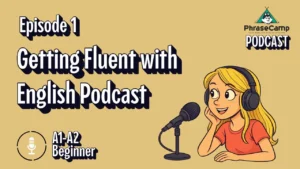In this blog post, master an Advanced English Conversation with 5 key phrases from a nightmare Tokyo business trip. Enhance your Business English conversation skills and navigate unexpected situations confidently. Perfect for professionals seeking to excel in international business communications.

Table of Contents
- Introduction: Why Learning An Advanced English Conversation is Important
- Conversation: The Nightmare Business Trip to Tokyo
- Analysis: 7 Key Phrases to Learn
- “Don’t get me started.”
- “It gets worse.”
- “You poor thing!”
- “This story keeps getting better and better.”
- “I swear it’s the truth.”
- “Wouldn’t that have been my luck?”
- “I collapsed on the bed.”
- Tips for Using These Phrases in Conversation
- Conclusion: Mastering Advanced Conversation Skills with Real-Life Scenarios
Introduction: Why Learning An Advanced English Conversation is Important
In this blog, we’re going to explore an advanced English conversation that revolves around a business trip gone wrong. The conversation highlights some important phrases and expressions used in everyday business and travel contexts. If you’re an advanced English learner, this is a great way to practice understanding complex sentences, sarcasm, and conversational flow.
By analyzing this dialogue, you’ll pick up on 5 key phrases and understand how they are used in real-world conversations. Let’s dive into the conversation and break it down for better comprehension!
You can watch and hear the full YouTube video below:
Conversation: The Nightmare Business Trip to Tokyo
- Kris: Hey, Jane, how was your recent business trip to Tokyo?
- Jane: Don’t get me started. It was a nightmare!
- Kris: Oh no! Why?
- Jane: First, my flight from New York to Tokyo was delayed 7 hours because of fog, and when we finally departed, the plane had engine trouble mid-flight, and we had to make an emergency stopover at LAX.
- Kris: Oh, jeez…
- Jane: Oh, it gets worse. I had to transfer to another flight at LAX to reach Tokyo, but because a typhoon was approaching, that flight had to be canceled. I was stuck at the airport overnight!
- Kris: Wow. You’re kidding! Why didn’t you go to a hotel?
- Jane: I couldn’t! All the hotels in the area were booked! I had to sleep at the airport!
- Kris: You poor thing!
- Jane: That’s not the end of the story. It gets worse. During my flight to Tokyo, there was a mother and baby sitting next to me, and the baby ended up crying throughout the entire flight!
- Kris: Oh, that’s unfortunate.
- Jane: So, when I finally arrived in Tokyo, I was so exhausted mentally and physically that I dozed off on the bus on the way to the hotel.
- Kris: Don’t tell me you slept past your stop?
- Jane: Wouldn’t that have been my luck? No, somehow, I managed to arrive at my hotel in one piece, collapsed on the bed, and was just about to fall asleep when I hear my phone ring.
- (Smartphone ringing sound effect)
- Kris: This can’t be good. Who was it?
- Jane: It was my client! He wanted the meeting changed to that very day. In two hours!
- Kris: Oh no!
- Jane: It was a sudden change in his schedule, and if I didn’t meet him that afternoon, he wouldn’t have had any other time to meet me.
- Kris: This story keeps getting better and better.
- Jane: So here I am, half dead, half asleep, looking like a zombie about to go into a very important meeting with a very important client. I’m chugging my 4th cup of coffee, arrive at the client’s office, greet my client, and about to start the meeting when…
- Kris: When what?! Don’t stop! Keep going!
- Jane: When…I fell asleep.
- Kris: You didn’t!
- Jane: Maybe it was the jetlag that finally tipped me over the edge. I don’t know how it happened. My client’s assistant told me later that my head began to tilt forward until it collapsed onto the table with a thud.
- (Thud sound effect)
- Kris: Oh man.
- Jane: And then I started snoring….
- Kris: Get outta here!
- Jane: Like a yak.
- Kris: What?! This is insane! Tell me you’re joking!
- Jane: Nope. I swear it’s the truth. When I woke up, I even had to wipe the drool away from my mouth. Lucky for me, the client was kind enough to allow me to sleep for a few hours. He was already out of the office by then. I called a few times and even emailed him afterward, but he hasn’t responded since.
- Kris: Oh…my…God….Jane…
- Jane: So, yeah, my recent business trip to Tokyo was a complete nightmare.
Analysis: 7 Key Phrases to Learn
Now that you’ve read through the conversation, let’s take a closer look at 5 key phrases that will help you navigate similar advanced-level English conversations.
1. “Don’t get me started.”
This phrase is used when someone doesn’t want to go into detail about something because it would involve a long rant or explanation. It’s often used when the speaker is frustrated or overwhelmed by something.
Example:
- Person A: “How was your Monday morning?”
- Person B: “Don’t get me started. It was chaos.”
This expression is a great way to add natural emotion and context to your conversation, and it’s very common in casual English.
2. “It gets worse.”
This phrase is used to signal that the situation is about to become even more unpleasant or complicated. Jane uses it multiple times to build up the narrative of her “nightmare” trip.
Example:
- Person A: “I missed my bus.”
- Person B: “That’s unfortunate. What happened next?”
- Person A: “It gets worse, I also lost my wallet on the bus.”
This is a useful phrase for storytelling, especially when discussing frustrating or unfortunate situations.

3. “You poor thing!”
This phrase is an expression of sympathy, typically used to show empathy for someone who has gone through a tough time. In the conversation, Kris uses this to express her sympathy for Jane’s struggles.
Example:
- Person A: “I worked all weekend and didn’t get any sleep.”
- Person B: “You poor thing! You should take a break.”
This is a compassionate phrase to use when someone is sharing their problems or difficulties with you.

4. “This story keeps getting better and better.”
This phrase is often used sarcastically to comment on a story that is getting progressively worse or more unbelievable. Kris uses it to emphasize how Jane’s situation continues to deteriorate.
Example:
- Person A: “Then my laptop died right before the deadline.”
- Person B: “Wow, this story just keeps getting better and better.”
It’s a perfect way to add a bit of humor or sarcasm when listening to someone’s misfortunes.
5. “I swear it’s the truth.”
This phrase is used when the speaker feels that their story or statement may sound unbelievable, and they want to emphasize that it really happened. Jane uses this phrase to convince Kris that she’s not exaggerating about her experience.
Example:
- Person A: “I saw a deer in my backyard yesterday.”
- Person B: “Really?”
- Person A: “I swear it’s the truth!”
This phrase adds a layer of sincerity to your conversation, especially when the situation might seem far-fetched.

6. “Wouldn’t that have been my luck?”
This phrase is a sarcastic way to express that something unfortunate happening would have been in line with one’s bad luck. Jane uses it to imply that after all the misfortune she’s already experienced, missing her bus stop would have been expected.
Example:
- Person A: “Did you miss your flight too?”
- Person B: “No, but wouldn’t that have been my luck with everything else that went wrong?”
This phrase is typically used in a humorous or sarcastic tone when discussing a string of bad events. It’s a good phrase to use when you want to lightly complain about your misfortunes without sounding too serious.
7. “I collapsed on the bed.”
In this context, “collapsed” is a figurative way of saying someone lay down heavily due to exhaustion. It conveys a strong sense of fatigue, often after an intense or tiring experience.
Example:
- Person A: “How was your weekend?”
- Person B: “I was so exhausted from work that I just collapsed on the couch and slept all day.”
“Collapse” is commonly used when someone is extremely tired, either physically or mentally. It adds emphasis to just how exhausted the person was, making it a useful phrase when describing long trips, busy days, or challenging experiences.

Tips for Using These Phrases in Conversation
- Practice with a Partner: Role-playing scenarios similar to this business trip conversation can help you get comfortable using these phrases in context.
- Watch for Tone: Some phrases, like “Don’t get me started” and “This story keeps getting better and better,” can have sarcastic or humorous tones. Make sure to practice saying them with the appropriate emotional emphasis.
- Use Them in Storytelling: These phrases are great for telling stories about frustrating or complex situations. Try incorporating them into your own personal anecdotes to make your conversations more engaging.
Conclusion
This advanced English conversation about Jane’s nightmare business trip to Tokyo gives you a glimpse into how native speakers use specific phrases to express frustration, sympathy, and disbelief. By mastering these 7 key phrases, you’ll be able to confidently navigate conversations about stressful experiences, express empathy, and add more color to your storytelling.
Practice using these phrases in real-life situations, and soon you’ll find yourself speaking English with more confidence and natural fluency. Good luck, and be sure to avoid any business trips like Jane’s!

Recommended Article
Here is a recommended article for you: “120 Practical English Education Phrases to Discuss Your Studies”



